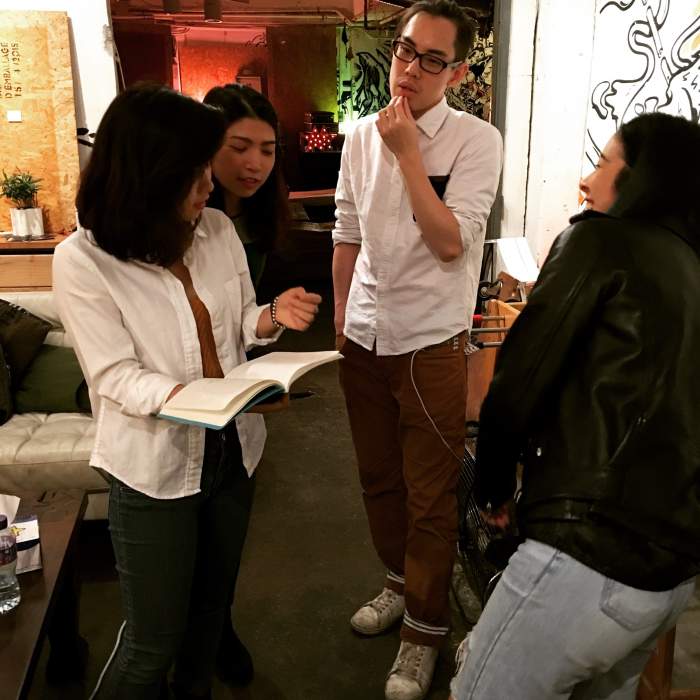How to Continue to Speak a Language

After all the blood, sweat and tears it takes to learn a foreign language…
The one thing you really want to avoid is…
Forgetting it!
"Imagine if I lost this language, after all those years spent learning it!"
Well, fear not!
Learning how to maintain a language is easy and the maintenance is far more fun than learning it. In this article, I'm going to share with you what I've learnt about how to not forget a language from my experience of studying ten languages.
By the way, when keeping up with foreign languages, using the right method to learn it in the first place is key.
My courses teach you through StoryLearning®, a fun and effective method that gets you fluent thanks to stories, not rules.Find out more and claim your free 7-day trial of the course of your choice.
Learning vs Maintaining Languages
Here's the truth…
I've never lost a language that I once spoke well.
Even French, which I learnt in Paris in 2001 and have hardly spoken since…
It's still there! (Just about!)
On the other hand, when I've learnt a language to a lower level, such as my Italian, and then taken an extended break, it's since disappeared.
There's a startling difference between what's happened to the languages I know well, and those I don't.
In fact, with the languages I know well, maintaining them takes very little effort.
So, where's the tipping point?
For me it seems to be at a B2 or upper-intermediate level.Polyglot friends of mine also say the same.
This seems to be the point where you've developed such a strong command of the language, that daily communication is no longer a challenge.
When you know a language on such an intuitive level, it's hard to forget.
As a result, when talking about the topic of maintaining a foreign language, I tend to simplify things as follows:
- From beginner to intermediate level, I'm learning the language (talk of maintaining your level is premature… you're still learning!)
- From upper-intermediate onwards, I could reasonably stop studying the language and simplymaintain it.
If you haven't reached that B2 level yet, I would strongly advise you to keep going until you do, before you take your foot off the gas.
If you stop too soon, you may find it hard to even maintain the level you've reached – here's what happened with my Thai when I did this.
Of course, a lot of the above is an oversimplification, but I find it to be a helpful way of looking at the topic.
So, you've learnt a new language…
You're pretty awesome at it…
But your circumstances have changed, and you're not actively learning it anymore.
What should you do to maintain it?
How to Maintain a Language in 7 Steps
Most blog posts I found on this topic just tell you the blindingly obvious…
- Watch movies!
- Read books! (Although as the creator of the StoryLearning® method, I have to say that reading stories is crucial to learning and maintaining my languages)
Sure, you can do that… but how about something a bit more adventurous?
My view on how to maintain a foreign language is simple…
If you've gone to all the effort of learning a new language, there's only ONE thing that makes sense for you to do:
Make your new language a living, breathing part of your life…wherever you live!
That will take care of the maintenance problem for you.
To be honest, you don't really have another choice.
Languages are learnt in order to be used, so there's no sense in putting off the "using" till later.
Watching movies and reading books are great things to do in the comfort of your own home, but with some creativity and energy, there are all kinds of great things you can do to use your language skills, maintain your level, and have fun at the same time!
1. Language Exchanges…In Your Second Language
You've probably had a language exchange before, but there's no need to limit it to your first language.
For example, let's say you want to maintain your Japanese, but also fancy learning some French.
Well, you can look for a French-Japanese language exchange, where you're the one offering your Japanese conversation!
This is more common than you might think.
Speaking your second language with a complete beginner can be an eye-opener, and a big motivation boost.
You'll realise just how much you know, but also push yourself to speak more accurately.
Websites to use:
- ConversationExchange.com
- MyLanguageExchange.com
2. Attend Social Events
If you live in a big city, you'll find tonnes of language events to attend. Forgetting a language won't be possible!
Rather than the usual Meetup groups, though, look for events that take place in the language you're learning.
Start by searching for the relevant cultural institution of your target language, such as:
- Alliance Française
- Goethe Institut
- Japan Foundation
Look in their Events section and sign up to their mailing list.
Something that's worked well for me in the past is to find the universities near you with large language programmes.
They will often have societies that run events for specific languages, with mailing lists and Facebook groups.
Check out the Thai Society at SOAS in London, for example. Attending events like these is one of the best ways to snap out of the "study" mindset, and actually live the language.
3. Study & Learn In Another Language
If you're like me and are always curious about learning new things, doing so in the language you're trying to maintain is a no-brainer.
Personally, I like watching TED talks in foreign languages, but you can also take free courses in foreign languages run by universities.
Here are just a couple of ideas to whet your appetite:
- Universitat Autònoma de Barcelona
- University of Zurich
Coursera also currently has free courses in 9 languages.
Is it possible to forget a language when you use this full-immersion approach?
If you're up for the challenge, it's extremely powerful!
4. Switch the Language of Your Online Activities
Make a quick mental note of 3 online activities you do every single day – what are they?
I'm thinking:
- Google search
- reading the news
- looking for recipes.
You can start doing all these things in the language you're trying to maintain.
It might slow you down at first, but it's a helpful way to keep learning. How to maintain fluency in a language in this way? In each of these cases, you're looking for specific pieces of information, which means you're motivated to understand what comes back at you.
The biggest roadblock to doing this regularly is… you!
Personally, I find it hard to snap out of regular habits like typing in "bbc.co.uk" whenever I want the news, but you can make the switch once you decide!
5. Teach the Language to Others

If you liked the first item on this list (language exchanges), this one might be a great fit for you.
You've probably never considered teaching your second language to anyone, but… why not?
Some of the best language teachers I've ever met have been non-native speakers, because they understand what it takes to learn the language, and can explain things to others from the perspective of a fellow learner.
You don't necessarily need a qualification (although, you could look into it for an additional challenge!), and could start by volunteering in your local community, teaching a friend, or a children's group etc.
If you're confident, you could offer lessons online on a service like iTalki.com.
It's well-known that the best way to truly master something is by teaching it.
6. Create Your Own Resources & Help Others
This is something close to my own heart, as you can imagine!
The blog you're reading right now is the result of my desire to express my thoughts about language learning to the wider world.
In writing about language learning on my blog and podcast, I develop my own ideas and improve my ability to teach this stuff.
When I write blog posts about how to learn Spanish, I improve my own learning directly.
I'm so passionate about languages that I create my own original material for the marketplace, which I hope improves the options for language learners worldwide.
In creating those materials, I learn and improve in those languages myself.
For example, I'm currently in the middle of creating new collections of dialogues in 6 languages, for listening practice.
I'm basically making the materials that I want to use in my own language learning – it's a passion project.
In the entire creation process of those dialogues, from commissioning them to quality checking, I'm learning and improving myself.
I advised Jonathan to do this in a recent podcast, and it's one of most unique, creative ways to maintain a language while contributing to the wider world.
7. Start a Meetup Group
You've heard of Meetup.com of course, but why not start your own meetup group?
In the spirit of the rest of this post, it's another way to take ownership of language learning, to be the creator rather than the learner.
If you've been to a meetup before and not enjoyed the way it was run, or you think it could be done differently… what's stopping you?
My friend Robin runs a Chinese-language meetup group in London.
You'll commit yourself to spending time with the language, and make it a long-term endeavour by creating a community at the same time.
Head over to Meetup.com right now and start exploring options!
Now You Know How to Not Forget a Language!
I hope this post has inspired you to forge your own path when deciding how to maintain a language.
For me personally, the thing that makes all the difference is making friends who speak a language I know
It's the biggest joy in language learning.
It's what motivates me to keep going, and what helps me maintain my level.
But whatever you most enjoy, and however you like to learn, if you set out to make the language a true part of your day-to-day, and even try to help others learn, you will never be in any danger of losing that language you've worked so hard to learn.
mccrackencomir1936.blogspot.com
Source: https://storylearning.com/blog/maintaining-a-foreign-language
0 Response to "How to Continue to Speak a Language"
Post a Comment